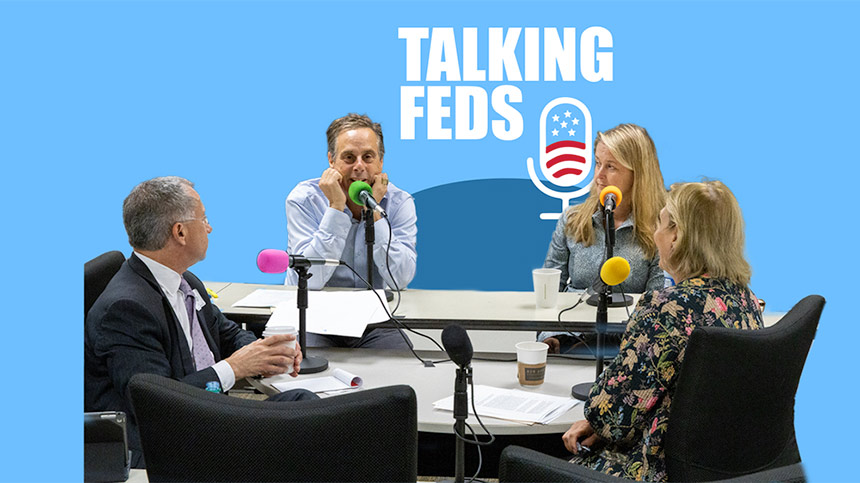
By Andrew Cohen
In 2016, with America seemingly polarizing at warp speed, Harry Litman noticed a troubling byproduct: political talking heads “issuing confident sound bites as if the answers were clear, when typically they were more nuanced.”
A renowned litigator and former U.S. Attorney, Litman was making the rounds himself on MSNBC, CNN, and Fox News. But with each appearance, seeing pundits brashly “assuming the posture of some sort of swamis who had the secret code book,” he yearned for a new paradigm. Enter the weekly “Talking Feds” podcast, which Litman launched in 2019 and quickly vaulted to prominence.
“I wanted more authentic, dynamic discussions among players in the criminal justice system that better captured the complexity and differences of opinion of actual decision making in a prosecutor’s office — a subject that seemed to greatly interest the public,” he says. “But little by little, it broadened into a law and politics survey that consistently includes the caliber of guests you might see on a Sunday national talk show.”
U.S. senators. Members of Congress. Leading news anchors. Top journalists. Nobel Prize-winning academics. Usually focusing on the week’s events, “Talking Feds” also produces topical episodes, for example on big agriculture (with New Jersey Senator Cory Booker) and economic policy (with renowned economists Paul Krugman and Larry Summers).
Another compelling feature: Midway through each episode, a celebrity guest explains a basic legal concept. “Sidebar” A-listers have included Jack Black, Robert DeNiro, Frances McDormand, Judd Apatow, Jane Lynch, Carole King, Andy Cohen, Cecily Strong, and Martina Navratilova.

By independently producing and distributing “Talking Feds,” Litman maintains editorial control. It has a 4.8-star rating out of nearly 3,000 reviews on Apple’s podcast site, and in March 2020, Marie Claire named it America’s second-best political podcast to prepare listeners for that year’s presidential election.
“I’m a little perplexed how the stars have aligned so well,” he says. “I feel ridiculously fortunate, especially because this whole thing was completely new to me when I created the podcast.”
Litman recently added a new related franchise entitled “Talking Books,” a one-on-one format where he interviews authors — mostly political figures but also scholars — of prominent current books. Episodes are released every six weeks, and the impressive list has featured Adam Schiff, Maggie Haberman, Jamie Raskin, Phil Rucker and Carol Leonnig, George Will, Bob Woodward and Robert Costa, Eric Swalwell, Anne Appelbaum, and Elie Mystal.
“I spend a lot of time with colleagues reading the book and preparing for the episodes,” Litman says. “We try really hard to go to school on all the discussions they’ve had to date — from six-minute TV hits to longer interviews — and dig into new interesting areas they haven’t covered.”
Illumination in Berkeley
Litman wasn’t fully sure about his decision to attend law school before enrolling, but it didn’t take long to quell that uncertainty.
“I felt intellectually at home from the first day,” he says. “I think the most meaningful aspect of my time was first, learning from Professor (Melvin) Eisenberg, who made even contracts and corporations — topics I assumed I would find dry and too businesslike — precise and beautiful. In his hands, the courses were more about moral theory than commerce.
“The other most meaningful time was work on the California Law Review, which had the fun and satisfaction of a shared mission that was a counterweight to going to class and taking exams.”
Litman served as editor-in-chief, and after graduating landed clerkships for U.S. Supreme Court Justices Thurgood Marshall and Anthony Kennedy. He quickly climbed the ranks as a prosecutor, and then as a private practice attorney specializing in whistleblower and qui tam litigation.
Calling the transition a natural extension of his work in government, Litman gained a strong foothold navigating False Claims Act cases, which are brought in the name of the government with the goal of having the government formally join the case.
“A law school professor I greatly admired, Jan Vetter, told me that the secret to being happy in law practice was to want what your client wants,” he recalls. “When your client is a whistleblower who comes forward with evidence of widespread fraud that knowingly cheats taxpayers, it’s easy to want what your client wants.”
Litman has worked with prominent large whistleblower firms while still maintaining his own practice, writing as a legal analyst for the New York Times, Wall Street Journal, and other top publications, and teaching at several law schools. Listed in Best Lawyers in America for Commercial Litigation, White Collar Criminal Defense, and Qui Tam Law, he’s now the Los Angeles Times’ legal affairs columnist.
“They didn’t tend to diagnose it when I was a kid, but I think I have ADHD,” Litman says. “It just seems to suit me to be continually moving from one thing to another.”